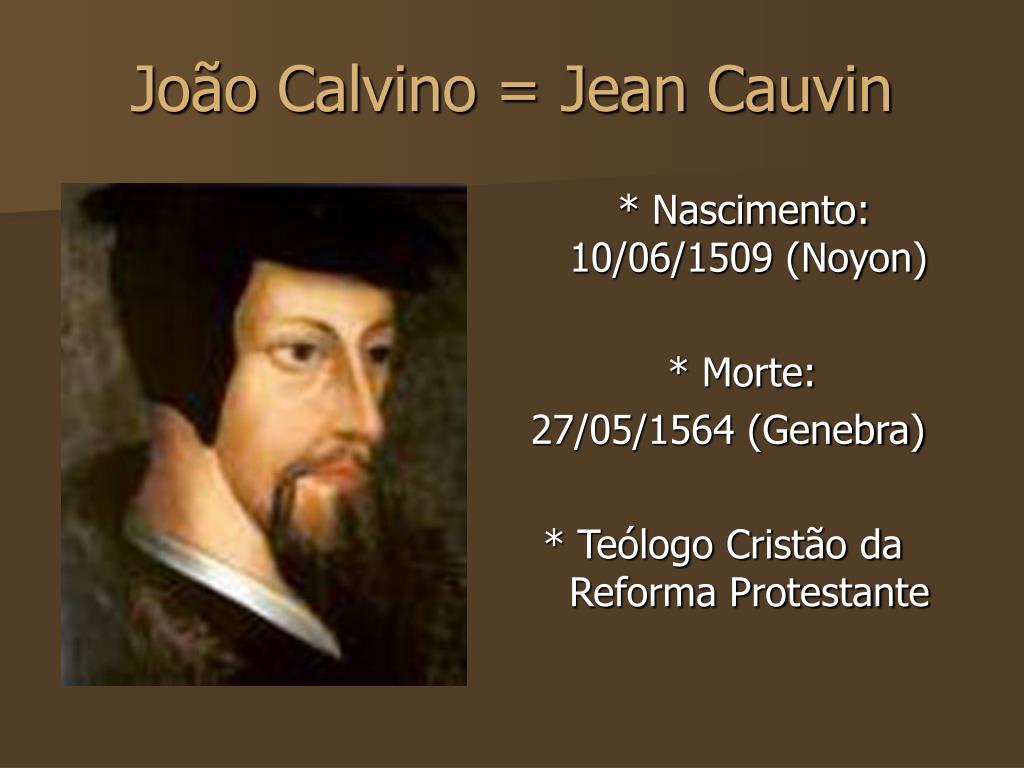John Calvin: French theologian and founder of Calvinism.
The influence of Calvinism on culture and society. Calvinism emphasized the importance of work, education and social justice, which contributed to the development of capitalism, democracy and equality.

John Calvin: French theologian and founder of Calvinism.
John Calvin was a French theologian, born in Noyon, in the north of France, in 1509. He is considered the founder of Calvinism, a branch of Protestantism that spread throughout Europe and America.
Calvin studied law in Paris and then theology in Geneva, Switzerland. In 1536, he published his most important work, Institution of the Christian Religion, which is a theological treatise setting out his beliefs and ideas.
Calvin believed that salvation was a gift from God, granted to the elect, regardless of their works. He also defended the doctrine of predestination, which states that God chose, before the creation of the world, who would be saved and who would be damned.
Calvin's ideas were very influential in the Protestant Reformation. He was one of the main leaders of the Reformation in Switzerland and helped establish Reformed churches throughout Europe.
Biography.
John Calvin was born in Noyon, in the north of France, in 1509. He was the son of a lawyer and a woman from a noble family.
Calvin studied law in Paris, but soon became interested in theology. In 1533, he converted to Protestantism and was forced to flee France.
In 1536, Calvin published his most important work, Institution of the Christian Religion. This theological treatise sets out his beliefs and ideas, which profoundly influenced the development of Calvinism.
In 1536, Calvin was invited to Geneva, Switzerland, to help reform the local church. He remained in Geneva until his death in 1564.
Theological ideas.
Calvin believed that salvation was a gift from God, granted to the elect, regardless of their works. He also defended the doctrine of predestination, which states that God chose, before the creation of the world, who would be saved and who would be condemned.
Calvin believed that the church should be a community of saints, who came together to worship God and to promote social justice. He also defended the separation of church and state.
Influence.
Calvin's ideas were very influential in the Protestant Reformation. He was one of the main leaders of the Reformation in Switzerland and helped establish Reformed churches throughout Europe.
Calvinism spread to England, Scotland, the Netherlands, France, Germany and the United States. It had a profound impact on the culture, politics and society of these countries.
Works.
Institution of the Christian Religion (1536).
Commentaries on the Bible (1540-1564).
Letters (1536-1564).
Legacy.
John Calvin is considered one of the most important theologians in history. His ideas had a profound impact on the development of Protestantism and Western culture.
Calvinism is one of the main currents of Protestantism. It is characterized by its belief in predestination, the importance of the church and the separation of church and state.
Calvinism has had a profound impact on the culture, politics and society of many countries. It is considered one of the factors that contributed to the development of capitalism and democracy.
The influence of Calvinism on culture and society.
Calvinism has had a profound impact on the culture and society of many countries. Some of the main contributions of Calvinism include:
The development of capitalism: Calvinism emphasized the importance of work and diligence, which contributed to the development of capitalism.
The strengthening of education: Calvinism valued education, which led to the development of schools and universities around the world.
The promotion of social justice: Calvinism advocated social justice, which led to social reforms in many countries.
Calvinism in France.
Calvinism had a significant impact in France. The country was divided between Catholics and Protestants, which led to a series of conflicts, including the Thirty Years' War (1618-1648).
Despite the persecution, Calvinism continued to grow in France. In 1559, the *French Congregation was founded, an organization that brought together French Protestants.
After the French Revolution (1789), Calvinism was legalized in France. Today, the country has a small Calvinist population, but Calvinism continues to have an impact on French culture.
Calvinism in England.
Calvinism also had a significant impact in England. In 1534, King Henry VIII separated the Church of England from the Roman Catholic Church.
English Protestants were divided into two groups: the Puritans, who advocated a more radical reform, and the Anglicans, who advocated a more moderate reform.
The English Calvinists were the main leaders of the Puritan Revolution (1642-1651). During this period, Calvinism was the official religion of England.
After the restoration of the monarchy (1660), Calvinism was again persecuted in England. However, Calvinism continued to have an impact on English culture.
Calvinism in the United States.
Calvinism had a significant impact on the United States. The first American settlers were predominantly Calvinists, and Calvinism was the country's dominant religion until the 19th century.
Calvinism influenced American culture in a number of ways, including:
The development of democracy: Calvinism emphasized the importance of freedom and equality, which contributed to the development of democracy in the United States.
The spirit of entrepreneurship: Calvinism emphasized the importance of work and diligence, which contributed to the development of the spirit of entrepreneurship in the United States.
The importance of education: Calvinism valued education, which contributed to the development of the American educational system.
Some examples of the impact of Calvinism on culture, politics and society:
In culture, Calvinism influenced the development of education, music and art. For example, the public education system in Switzerland was founded by Calvinists.
In politics, Calvinism influenced the development of democracy in England, the United States and other countries. For example, the United States Declaration of Independence is based on the Calvinist principles of religious freedom and the separation of church and state.
In society, Calvinism influenced the development of capitalism. For example, Calvinists believed that work was a form of worshipping God. This led to the development of a work ethic that was fundamental to the growth of capitalism.
John Calvin was a theologian, reformer and religious leader who had a profound impact on history. His ideas are still relevant today and continue to be studied and debated by theologians and scholars around the world.
About the Creator
josias alves
Além de contar histórias, Josias também gosta de falar sobre curiosidades históricas. Ele acredita que a história é cheia de fatos interessantes que muitas vezes passam despercebidos.






Comments
There are no comments for this story
Be the first to respond and start the conversation.